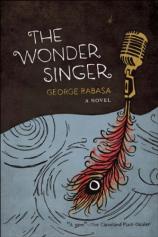Interview: June 26, 2009
June 26, 2009
George Rabasa's third novel, THE WONDER SINGER, is about a ghostwriter asked to pen the autobiography of an aging, legendary opera diva who dies unexpectedly before the project is completed. In this interview with Bookreporter.com's Eileen Zimmerman Nicol, Rabasa discusses the challenges of writing in the story-within-a-story frame, and explains who inspired --- both in name and personality --- the book's main character. He also describes his unconventional writing process, reveals how his former career in advertising helped hone his voice as a writer, and compares and contrasts the life of an author with that of a performer.
Bookreporter.com: THE WONDER SINGER is a book within a book, about a ghostwriter taking on a famous opera diva. What drew you to an opera diva as a subject?
George Rabasa: My intention was to write a sort of picaresque novel about a ghostwriter. In my checkered professional life I’ve written in practically every medium, besides fiction, with varying degrees of success: commercials, direct mail, restaurant menus, reviews, speeches, obituaries and jokes. But I was never a ghostwriter. The idea of a journeyman writer serving as the voice for a famous personality has a kind of elegance to it. I needed a bigger-than-life foil for the humble scribbler. There are no bigger personalities than old-school opera divas. And the irony of serving as the conduit for a voice that cannot sing her own song captivated me.
BRC: What are the risks of writing about writers?
GR: The challenge was to create a dynamic personality that could be a counterpoint to the Diva’s. The fact that he is a writer is incidental to the greater truth about Lockwood --- a bit of a schlub and a slacker who stumbles into the one redeeming project of his career. He is a generally uninspired writer who discovers the power of art, both in himself and in his subject.
BRC: How did you choose the writer’s name: Mark Lockwood?
GR: Mark is the first name of the college professor who inspired me to become a writer. Lockwood was a college beer-drinking buddy with whom I had long meandering conversations on life and literature. Using their names was an arbitrary, playful choice, but through the early drafts I found the blending of their personalities appropriate to my character. And the name stuck. It’s has also been noted that Lockwood is the name of the character in WUTHERING HEIGHTS who gets the story of Heathcliff and Catherine out of the old housekeeper, Nelly. This is an instance of involuntary brilliance on my part.
BRC: In the book, famed opera singer Mercé Casals receives two peacocks as a gift from an admirer. Peacocks or peacock feathers adorn the book’s cover. Are they a symbol for Mercé herself? In what ways?
GR: The peacocks relate to Mercé’s love of beauty and luxury. A suitor would need to do much more to attract her attention than simply offer roses at the end of a performance. The Prince who courts her sends peacocks to get her attention. And, to her misfortune, the gambit wins her over.
BRC: Mercé’s feelings for her husband Nolan go stale, she says, because he didn’t change his shirts often enough. Lockwood and his wife Claire have drifted apart over the years, leaving him susceptible to a crush on Mercé’s young nurse Perla. How are your views about long-term relationships reflected in this book?
GR: My wife and I have been together for over 30 years, for which I’m grateful every day. Yet in the course of a marriage there can be stumbles and slips. The fact that couples recover and go on proves ultimately rewarding. Mercé and Nolan had a difficult relationship, in which his unwashed shirts were merely a symptom of their individual self-absorption. They loved themselves more than each other. Lockwood and Claire, on the other hand, appear they will get back together. I mean, he cleans the house to prepare the way for her return!
BRC: “The project has become an unwieldy beast to be tamed and contained, all flesh and blubber, without head or tail, without a spine or limbs to help it stand or sit or even lie with a measure of grace.” That’s how Lockwood feels about his book partway through. Did you ever feel that way about THE WONDER SINGER? If so, what did you do about it?
GR: Oh God, yes! I will never write a novel this way again. I had the basic structure --- Lockwood’s attempts to write his big book, the story of La Señora in her own words, the relationship between the writer and the diva. So for about two years I just wrote random scenes, fragments, snatches of dialogue as the mood hit me, with the idea of putting it all together eventually. After about 130,000 words I had a mess to cut and paste into some coherent arc. A wonderful mess to be sure. But it took years of grief, and thousands of words cut, to come up with the novel that is the object of our attention today.
BRC: “In the end the voice does what it wants,” says Mercé. Do you feel that way about your writing voice? Does Mark Lockwood feel that way?
GR: Hearing a soprano cut through the stillness of the concert hall is to witness a small miracle. The sound that comes out of the throat seems downright magical. And the physiology that allows this to happen can be capricious and unpredictable. Even a great singer can let out a break or a yelp, a sour note or a flat intonation. Writers, in comparison, have it easy: We tinker and polish in solitude and only come out in public when we feel we have nailed down the tone and music of the narrative voice.
BRC: Do you think of Mercé Casals as tragic or comic, or both?
GR: As I began to imagine Mercé Casals, I reached for the bigger-than-life women in my own family. I also read a particularly lurid biography of Maria Callas, as well as reams of lore on the bad old days of opera. They don’t make divas like Mercé Casals anymore. The challenge was to endow her with the full grace and dignity of a real human being --- not a caricature or comic character. After a while, as I wrote, I took her eccentricities for granted, and concentrated on giving her a rich and deep inner life, touched by love, disappointment and the world’s inevitable cruelties. As a result, I hope my Diva will engage the reader’s heart and mind at a basic human level.
BRC: How long did you work on THE WONDER SINGER? Is your writing process stressful like Lockwood’s? Do you set yourself deadlines?
GR: Lockwood goes though great stress writing the diva’s memoir because of the deadline race against the more famous writer, Alonzo Baylor. In my writing, I tend to be slow and patient and disciplined. I seldom have hard deadlines, but only vague goals. My writing life would make a sublimely boring novel, a fit cure for insomnia.
BRC: What is your editing process like? Do you work with trusted readers to guide you with early drafts?
GR: The process is no process. I tinker and stab and nudge like someone feeling his way in the dark. The idea of a novel germinates over time before I start writing, less a clear plot than a problem of narrative to be solved. Unlike a short story, the idea can remain diffuse and amorphous for the two years it may take me to complete a draft. In that time, the original impulse grows and expands so that every writing day is one of discovery for me. I am both writer and audience. I don’t often know the ending until I get there. It’s a wonderful process, like driving to the seashore -- as I travel, the scent of the ocean grows and pulls me to its destination.
I don’t show work in progress to anyone. When I think I have a solid draft, I will show it to my wife and possibly an editor friend I trust. Then, it’s back to the computer for heavy lifting until another draft goes to a couple of writer friends with whom I often exchange heartfelt opinions on each other’s work.
BRC: You share with Lockwood the experience of working in advertising. Do any of the skills you use in advertising carry over to writing literary fiction?
GR: I learned quite a bit from my years in advertising. Mainly to seduce the attention of a reader/viewer who always has the option to tune me out. In advertising, the threat is the click of the remote; in fiction, there is always another book waiting in a pile. I also learned to work when I didn’t feel very smart or creative. And found that if I weep and beg for the muse, she occasionally shows up.
BRC: When inspiration wanes, how do you refresh it?
GR: I’m not sure I am blessed with enough inspiration for it to actually wane. Feeling inspired is more the exception than the rule. In any case, I run, I meditate, I wait. And work without the benefit of inspiration. The fact that good work happens never ceases to amaze me.
• Click here now to buy this book from Amazon.
© Copyright 1996-2011, Bookreporter.com. All rights reserved.




